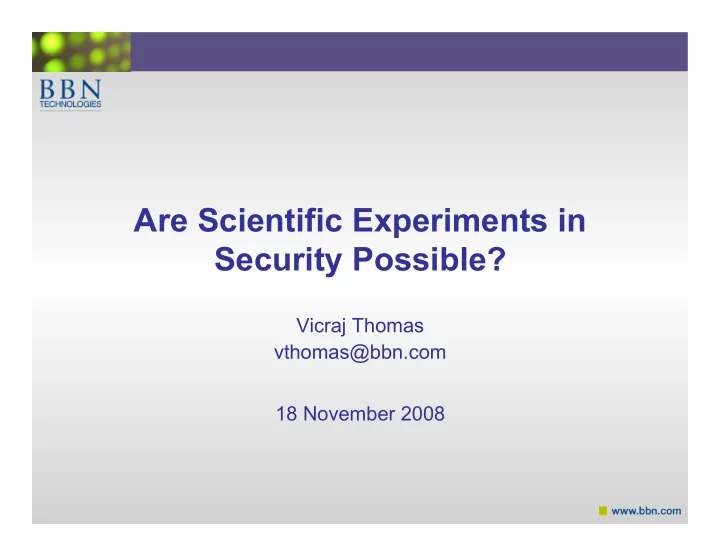

Are Scientific Experiments in Security Possible? Vicraj Thomas vthomas@bbn.com 18 November 2008
Experimentation is Difficult • Difficult in any discipline – Time consuming, tedious – Expensive • But… – It is a key piece of the scientific process – Journals in most scientific disciplines will not publish results not substantiated by analysis or by experimentation • Including social sciences! 2
Experimentation is Useful • Many examples in CS of hypothesis validated / invalidated by experiments • Locality of reference by programs – Experimentally confirmed – Principle used to optimize many techniques • Independence of failure probability of multiple versions of a program – Experimentally disproven – Resulted in change in software development practices in aerospace industry 3
Yet Experimentation in CS is Lacking • Lack of training in experimentation • Unsubstantiated claims readily published – 40% of ACM papers in 1993 had no empirical or theoretical backing [Tichy et al., J. of Systems and Software, Jan 1995] – 40-50% of software engineering papers are unvalidated [Zelkovitz, IEEE Computer, May 1998] • Demonstrations favored over experiments • Situation is probably worse with security research 4
Lack of Experimentation Shows • No good way to evaluate return on investment in security products – Large numbers of products of questionable value • Fundamental mismatch between systems’ models of users and reality. Users blamed for poor security. – Unrealistic expectations for configuring security • 9 steps and six interfaces to configure permissions on a shared folder in Vista – Security “warnings” that are cryptic • Look just like other dialog boxes • No indication of level of risk 5
Experimentation in Security is Hard • Large number of variables (factors) – Need to identify key factors • Attacker modes are hard to specify – Unlike dependability community that has failure modes, failure rates, etc. 6
Needed: Canonical Attacker Models • Models that reflect capabilities of the attacker – Access to compute resources, network resources; physical access • Parallel: Attacker model used secure White House differs from attacker model used to secure our homes • Example attacker model for a jamming- resistant wireless link: – Attacker’s max transmit energy, time to switch from listen to jamming mode, minimum distance from receiver, number of attackers 7
Needed: Testbeds and Data Sets • Community accessible • Configurable to repeat/extend experiments • Realistic in number and type of resources 8
Testbeds: NSF GENI • Infrastructure for long-running, realistic experiments in Network Science and Engineering – Experimentation in a controlled environment – Repeatability, archival – Community-based experimentation • GENI needs you! – Solicitation 2 coming out shortly 9
Testbed: DARPA National Cyber Range • For testing classified and unclassified software systems • Ability to replicate large-scale military enclaves • Repository for tools, recipes and architectures • Forensic quality data collection, analysis and presentation 10
Future: Community Experimentation? • Is community based experimentation the future? – Numbers of researchers and community members participating in experiments • Improve security of systems • Improve attacker models 11
Summary • Science of Security is incomplete without experimentation • Increased recognition of this fact • Facilities being created to support experimentation • Hope: We won’t have a panel discussion like this 3-5 years from now 12
Recommend
More recommend